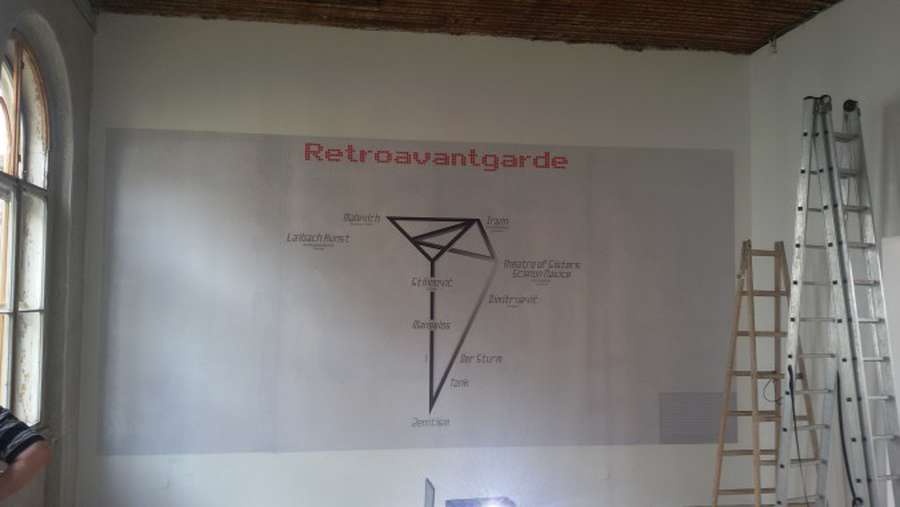Upside Down
Hosting the Critique
Upside Down: Hosting the Critique is a co-curatorial cross-disciplinary exhibition, which focuses on the transformation of the role(s) of museums, galleries and other public institutions in the production, presentation and collection of contemporary art in periods of transition and the part played by artists and independent artist-run spaces in these activities.
Opening of the exhibition on Friday, 24 June at 7 pm at Belgrade City Museum.
List of artists: Azra Akšamija, Luchezar Boyadjiev, Yane Calovski & Hristina Ivanoska, Vlasta Delimar, Goran Đorđević, Miklós Erhardt, Stano Filko, Fokus Grupa, Liljana Gjuzelova & Sašo Stanojkoviќ, Jusuf Hadžifejzović, IRWIN, Sanja Iveković, Dalibor Martinis, Mladen Miljanović, Alex Mlynárčik, Ivan Moudov, Ilona Németh, Elif Öner, Dan Perjovschi, Lia Perjovschi, Tadej Pogačar, Zoran Popović, Vladan Radovanović, Tamás St. Auby, Škart, Apolonija Šušteršič & Bojana Kunst, Raša Todosijević, Goran Trbuljak, Nomeda & Gediminas Urbonas and GVS group, Martin Zet.
The exhibition Upside Down: Hosting the Critique is built on the long-term
After the realization of the first exhibition, publication and the conference in Ljubljana, the decision was made to form a joint curatorial-research team comprising six curators and researchers (Zoran Erić, Alenka Gregorič, Vit Havránek, Suzana Milevska, Vladimir Vidmar and Raluca Voinea), who
"Upside Down: Hosting the Critique" is a co-curatorial cross-disciplinary exhibition, which focuses on the transformation of the role(s) of museums, galleries and other public institutions in the production, presentation and collection of contemporary art in periods of transition and the part played by artists and independent artist-run spaces in these activities.
The exhibition is an attempt to analyse the art practices that focus on critiquing the existing models of institutions, their programs and the working conditions they provide for art production and on the urgency of pursuing new alternative cross-institutional or trans-institutional models of institutions, strategies and roles of art institutions. The main project’s research questions are: how institutions influenced and changed each other while interacting and/or cooperating during the transition from centralized to free market economy and what was the artists’ and art project’s impact on such transformation. The project ultimately questions the outcomes and the limits of the institutional critique and
We are looking at concrete artistic practices that focused on critiquing the existing art institutions and on the urgency of pursuing new models, strategies and
The projects from the 1970s that are presented were seminal and specific for such debates in the different contexts of the then socialist countries even before and often regardless of the emergence of ‘institutional critique’ in the USA and Western European art. The socio-political and economic conditions in the socialist and post-socialist institutional context substantially differed and produced a completely different grid and pattern of relations between the institutions, artists, independent curators, etc.
In a situation where many of the regional institutions struggle with redefining their role or with the basic preconditions for their proper functioning, the task of this exhibition is to present and question different critical artistic reflections on the existing organizational models of institutions. The pertinent issue of the new-
Due to the long lasting institutional crises on the Belgrade scene where two major museums were closed for reconstruction, it is of utmost importance to revisit the potential of such an institution as the museum in the production of the cultural public sphere. The possible model of the critical Museum, which MoCAB strives to become, necessitates the creation of a platform for critical dialogues and reflections on situations of social transformation which marginalize culture to a great degree. In such situations it is fruitful to reflect on the institution itself, its potential to host radical and critical artistic practices and to reflect on the libidinal circuits between artists, institutions (museum) and the State. The question remains as to whether museums are capable of producing an "
Colophon
Project concept and initiation: Alenka Gregorič & Suzana MilevskaThe curatorial-research team: Zoran Erić, Alenka Gregorič, Vit Havránek, Suzana Milevska, Vladimir Vidmar and Raluca VoineaPartner institutions: City Art Gallery Ljubljana/MGML and the Museum of Contemporary Art, BelgradeSupport: Republic of Serbia. Ministry of Culture and Information; City of Ljubljana, Department for Culture; Embassy of the Republic of Slovenia Belgrade; tranzit.cz
Location
General information:
T +386 1 24 11 785
E mestna.galerija@mgml.si
School programs:
T +386 1 24 12 506
E prijava@mgml.si
Public relations:
T +386 41 669 599
E mateja.dimnik@mgml.si
Opening hours
Tuesday–Sunday: 11:00–19:00
Monday: Closed
1 January, 1 November, 25 December: Closed
24 and 31 December: 11:00–14:00
Tickets
Free entry.
City Art Gallery Ljubljana is a dog-friendly gallery.
